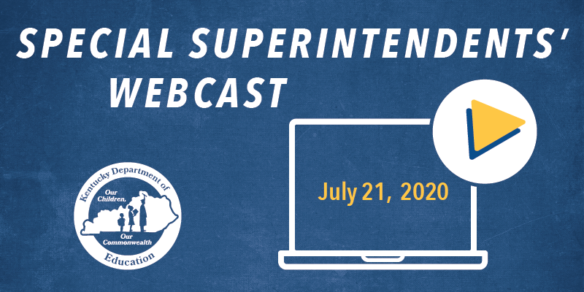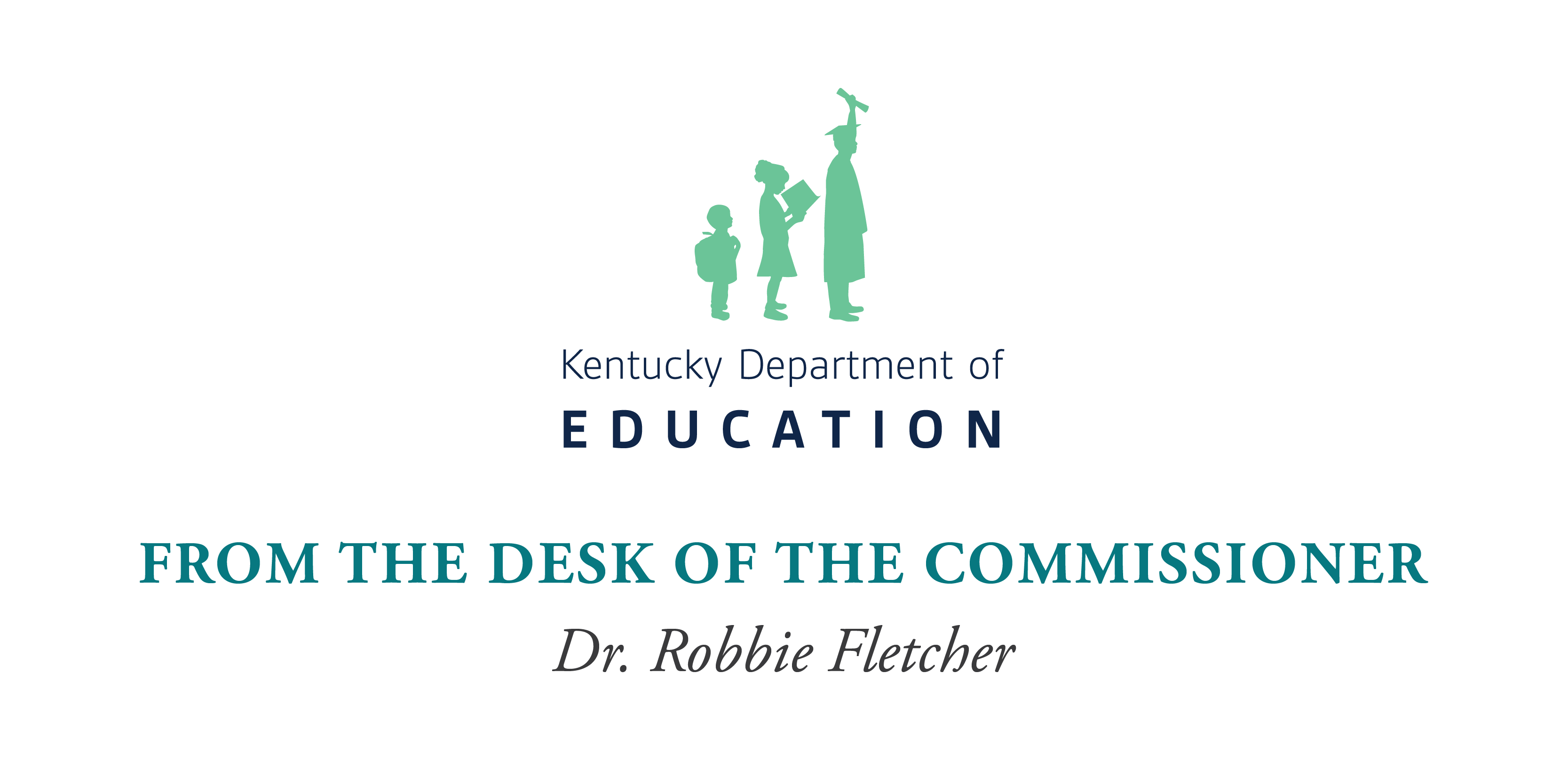
By Jim Gaines
jim.gaines@education.ky.gov
Lt. Gov. Jacqueline Coleman, who also serves as secretary of the Education and Workforce Development Cabinet, has signed a memorandum from Interim Commissioner of Education Kevin C. Brown that is the first step in giving local school boards more flexibility in offering emergency leave for school district employees affected by COVID-19.
The memo waives the normal 3-day limit on emergency leave, Brown said at the end of the July 21 Special Superintendents’ Webcast. Brown will recommend an emergency regulation to the Kentucky Board of Education that, if approved, will provide local school districts with the flexibility to grant additional emergency leave similar to that granted under Senate Bill 177, which expired with the end of the 2019-2020 school year.
New Guidance on Special Circumstances
At the start of the webcast, Brown reiterated that the Healthy at School guidance from KDE and the Kentucky Department for Public Health still is the flagship document for reopening schools this fall. Although it’s not a regulatory document, its standards on wearing cloth masks, social distancing, temperature checks, cleaning and contact tracing still are mandatory.
The document is available in six languages, including Chinese, thanks to translation help from the University of Kentucky and Jefferson County Public Schools, said KDE Interim Communications Director Toni Konz Tatman.
KDE’s COVID-19 webpage has links to all guidance issued since May 15, including three documents released this week, she said.
The documents, “COVID-19 Considerations for Reopening Schools for Exceptional Learners and Preschool Students” and “COVID-19 Considerations for Reopening Schools: Compensatory Education and Extended School Year Services,” provide guidelines, but there are “not a lot of simple answers” on reopening schools for students who have unique individual challenges, said KDE Associate Commissioner Gretta Hylton of the Office of Special Education and Early Learning.
For students who need teachers or staff closer than 6 feet, the document provides recommendations for personal protective equipment (PPE). Schools also should consult with their local health departments, said Veronica Sullivan, division director in KDE’s Office of Special Education and Early Learning.
Regardless of how schools choose to deliver instruction, school districts must provide free, appropriate public education (FAPE) to students with disabilities, said Sylvia Starkey, division director in KDE’s Office of Special Education and Early Learning. When that is not possible, the remedy is compensatory education. It is not a punishment for districts. The goal of compensatory education services is to place the student in the position he or she would have otherwise been in had there not been a denial of FAPE, she said.
Attendance and Remote Learning
School districts will take attendance of students attending in-person classes this year, but funding has been decoupled from attendance numbers, said David Cook, division director in KDE’s Office of Continuous Improvement and Support.
Instead of reporting attendance, schools will record student participation through Infinite Campus, he said. Participation must be recorded every day but can be entered on a weekly basis.
Standards are outlined in the guidance document “COVID-19 Considerations for Reopening Schools: Daily Participation and Non-Traditional Instruction.” An emergency regulation lays out four options for recording remote participation, Cook said. The state will collect that data from districts in October 2020, January 2021 and July 2021.
Talks on how, or whether, to hold assessment testing in the spring are underway on several levels, Brown said. The big question is whether the U.S. Department of Education is interested in waiving assessments this year, he said, and if there is a waiver, there likely will be some form of alternative assessment. He said he will leave that decision to incoming Commissioner of Education Jason Glass, who arrives in mid-September.
Town Hall on School Reopening
The state will hold a virtual town hall on reopening schools from 2-4 p.m. ET on July 23, co-hosted by KDE, Lt. Gov. Coleman and the Cabinet for Workforce Development, Brown said. The town hall is geared toward school staff but is open to the public. It will be available to watch on the KDE Media Portal.
Among the speakers will be Kentucky Department for Public Health (DPH) Commissioner Dr. Steven Stack, who will talk about how contact tracing has improved since the spring, Brown said. With good record-keeping and contact tracing, a positive COVID-19 test may only require pinpoint quarantines or closing a particular school instead of an entire district.
Mask Waivers
If a student has a medical waiver for wearing a face mask but is in class with other medically-fragile students, that doesn’t mean the unmasked student should be kept out of the classroom, Hylton said. It would require extra precautions in distancing and sanitization.
Similarly, accommodations should be sought for students who can’t wear masks instead of automatically moving them to all-virtual learning, said KDE Interim General Counsel Todd Allen.
Though Kentucky guidelines only require masks on children in 1st grade and above, local school districts can be more restrictive, mandating them for kindergarten and pre-K students as well, Brown said. Kentucky is “somewhere in the middle” when it comes to states’ COVID-19 restrictions, he said.
Dr. Connie White, DPH deputy commissioner, said her office is getting calls from doctors whose patients are demanding medical exemptions from wearing a face mask, but she said there are very few legitimate cases of people who can’t wear one. Students with mild asthma definitely need to wear masks because they’re at higher risk of serious COVID-19 infection, she said.
Parents of other students won’t typically be notified if a student has a medical exemption from mask-wearing, Allen said. Instead, schools should take extra precautions to distance students who are unable to wear a mask for medical reasons to protect both the student unable to wear a mask, as well as those wearing masks.
If a parent asks why a particular student isn’t wearing a mask, school administrators can say that a small number of people have medical exemptions, Allen said. They can say what steps the district has taken to keep students who aren’t wearing masks away from other students, he said.
“I think they need to be prepared to communicate with parents about that, without identifying any specific student or medical condition of that student,” Allen said.
Tighter COVID-19 Restrictions
Gov. Andy Beshear’s rollback on July 20 of public gathering sizes from 50 people to 10 covers social gatherings, not business or government activities such as classes, Brown said.
Also on July 20, Beshear said that people who visit states with a COVID-19 positive test rate of 15% or more should self-quarantine for 14 days. Teachers who visit any of the nine states Beshear named will be expected to do so, White said. Most of Kentucky’s recent COVID-19 outbreaks are linked to people who recently traveled to beaches, she said.
The federal Families First Coronavirus Response Act (FFCRA) provides for some paid leave due to COVID-19 quarantine, so school personnel may be eligible for leave under the FFCRA as well as accrued leave under local school district policy, Allen said.
Responding to some confusion over the 10-day standard for COVID-19 isolation and 14-day quarantine, White said the 10-day period is in response to a positive test for the virus. That person would need to be isolated for 10 days with no symptoms before returning to school, she said.
But if someone has potentially been exposed to COVID-19, they would need to quarantine for 14 days to see if symptoms appear, White said.
MORE INFO …
- July 21, 2020, Special Superintendents’ Webcast
- Kentucky Department for Public Health’s COVID-19 webpage
- KDE’s COVID-19 webpage
- KDE’s COVID-19 Reopening Guidance webpage
- Kentucky COVID-19 Hotline (800) 722-5725




Leave A Comment